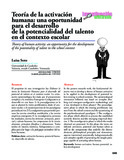Mostrar el registro sencillo del ítem
Teoría de la activación humana: una oportunidad para el desarrollo de la potencialidad del talento en el contexto escolar
| dc.rights.license | http://creativecommons.org/licenses/by-nc-sa/3.0/ve/ | es_VE |
| dc.contributor.author | Soto, Luisa | |
| dc.date.accessioned | 2018-09-27T18:11:10Z | |
| dc.date.available | 2018-09-27T18:11:10Z | |
| dc.date.issued | 2018-09 | |
| dc.identifier.issn | 1316-4910 | |
| dc.identifier.uri | http://www.saber.ula.ve/handle/123456789/45256 | |
| dc.description.abstract | El propósito de esta investigación fue Elaborar la teoría de Activación Humana para el desarrollo del potencial de talento en el contexto escolar. La orientación epistemológica fue dada por el pensamiento complejo y la metódica Emergente-Configurativa se desarrolló en tres fases: 1) la preconfigurativa en la que se planteó la visión problemática desde el contexto escolar y el cuestionamiento de los paradigmas psicoeducativos 2) La configurativa que permitió procesar las teorías científicas establecidas y las teorías empíricas emergentes 3) La reconfigurativa, presenta los resultados, teoriza los términos: activación, potencial y talento humano, los componentes de la teoría: elementos, principios filosóficos y dimensiones. Todos tejidos de manera sistémica, hologramática y compleja para dar lugar a la pedagogía activadora del talento humano. | es_VE |
| dc.language.iso | es | es_VE |
| dc.publisher | SABER-ULA | es_VE |
| dc.rights | info:eu-repo/semantics/openAccess | es_VE |
| dc.subject | Activación humana | es_VE |
| dc.subject | Potencial humano | es_VE |
| dc.subject | Desarrollo de talento | es_VE |
| dc.title | Teoría de la activación humana: una oportunidad para el desarrollo de la potencialidad del talento en el contexto escolar | es_VE |
| dc.title.alternative | Theory of human activity: an opportunity for the development of the potentiality of talent in the school context | es_VE |
| dc.type | info:eu-repo/semantics/article | es_VE |
| dcterms.dateAccepted | 15/07/2018 | |
| dcterms.dateSubmitted | 25/06/2018 | |
| dc.description.abstract1 | In the present research work, the fundamental objective was to develop a theory of human activation to be applied in the development of potential talent existing in school contexts. The epistemological orientation followed was based on complex thinking and emergent-configurative methodology and it was developed in three phases:1 The preconfigurative phase in which the existing problematic was seen from the school context and the questioning of the psychoeducational paradigms. 2 The configurative phase which allowed to process the established scientific theories and the emerging empirical theories. 3 The reconfigurative phase in which the results obtained are presented. In this phase the terms are defined: activation, potential and human talent as well as the components that underlie the theory: elements, philosophical principles and dimensions, aspects intertwined systemically, hologrammatically and complex capable of generating the sought pedagogy capable of activating talent human. | es_VE |
| dc.description.colacion | 649 - 663 | es_VE |
| dc.description.email | lusoto2004@hotmail.com | es_VE |
| dc.description.frecuencia | Cuatrimestral | |
| dc.identifier.depositolegal | pp199702ME1027 | |
| dc.identifier.edepositolegal | pp199702ME1927 | |
| dc.publisher.pais | Venezuela | es_VE |
| dc.subject.facultad | Facultad de Humanidades y Educación | es_VE |
| dc.subject.institucion | Universidad de Los Andes | es_VE |
| dc.subject.keywords | Human activation | es_VE |
| dc.subject.keywords | Human potential | es_VE |
| dc.subject.keywords | Talent development | es_VE |
| dc.subject.publicacionelectronica | Revista Educere | |
| dc.subject.seccion | Revista Educere: Investigación Arbitrada | es_VE |
| dc.subject.thematiccategory | Artes y Humanidades | es_VE |
| dc.subject.tipo | Revistas | es_VE |
| dc.type.media | Texto | es_VE |
Ficheros en el ítem
Este ítem aparece en la(s) siguiente(s) colección(ones)
-
Educere - Año 022 - Número 073
Septiembre - Diciembre 2018


